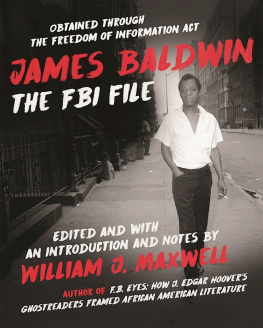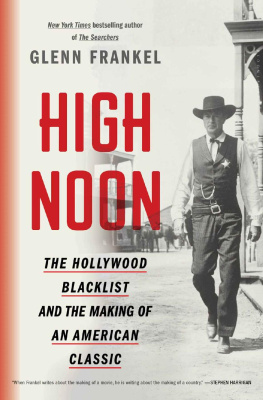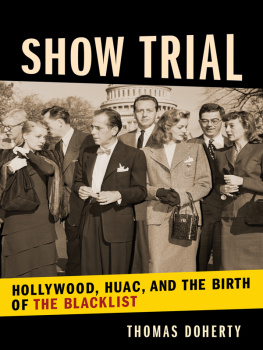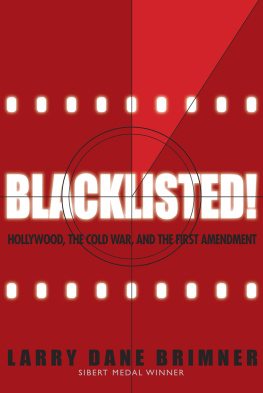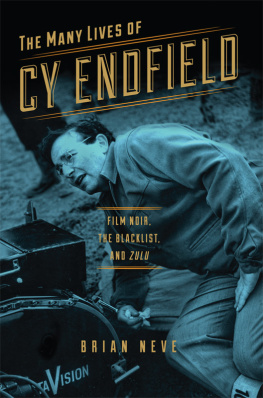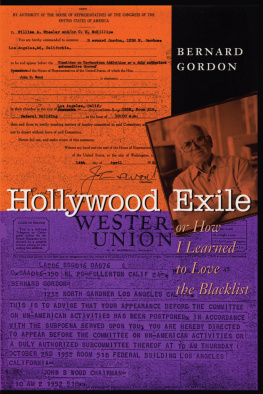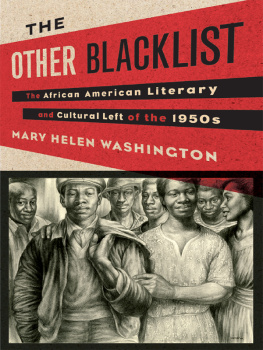The Broadcast 41
The Broadcast 41
Women and the Anti-Communist Blacklist
Carol A. Stabile

2018 Goldsmiths Press
Published in 2018 by Goldsmiths Press
Goldsmiths, University of London, New Cross
London SE14 6NW
Printed and bound by Sheridan, USA
Distribution by the MIT Press
Cambridge, Massachusetts, and London, England
Copyright 2018 Carol Stabile
The right of Carol Stabile to be identified as the author of this work has been asserted by her in accordance with section 77 and 78 in the Copyright, Designs and Patents Act 1988.
All Rights Reserved. No part of this publication may be reproduced, distributed or transmitted in any form or by any means whatsoever without prior written permission of the publisher, except in the case of brief quotations in critical articles and review and certain non-commercial uses permitted by copyright law.
A CIP record for this book is available from the British Library
ISBN 978 1 906897 86 4 (hbk)
ISBN 978 1 906897 87 1 (ebk)
www.gold.ac.uk/goldsmiths-press

[T]here are always those that will supply you with speeches of their own, and put them right into your mouth for you too; and that sort are like the magicians who can throw their voice, at fairs and shows, and you are just their wooden doll.
Margaret Atwood, Alias Grace
Fellow citizens: I am not indifferent to the claims of a generous forgetfulness, but whatever else I may forget, I shall never forget the difference between those who fought for liberty and those who fought for slavery; between those who fought to save the Republic and those who fought to destroy it.
Frederick Douglass, The Essential Douglas
Contents
Most of this book was written before sunrise, at my kitchen table in Eugene, Oregon. That table was held up by invisible networks of resistance, comfort, and delight. I am grateful to the many people whose hands made this work possible.
Some of the preliminary thinking and research for this book appeared in essays published elsewhere: The Typhoid Marys of the Left: Gender, Race, and the Broadcast Blacklist, Communication and Critical/Cultural Studies 8 (Fall 2011, pp. 26685) and We Can Remember It for You Wholesale: Lessons of the Broadcast Blacklist, in Moment of Danger: Critical Communication History, ed. Janice Peck and Inger Stole (Milwaukee, WI: Marquette University Press, pp. 10532).
Librarians and archivists around the United States made this book possible. At the University of Oregons Special Collections and University Archives, Linda Longs commitment to preserving writing and other materials created by women and her assistance in navigating the universitys incredible holdings on feminist science fiction gave me a new appreciation of the importance of women writers networks with one another and of the unsung labor of those peopleoften women as wellwho preserve these materials and make them available to scholars and students. I am grateful to Sarah M. Hutcheon, Lynda Leahy, and Caitlin Stevens at the Schlesinger Library who set me off in the right direction at an early point in my research, and to Diana Carey, who helped with access to images. The American Heritage Center staff carried more boxes back and forth for me than I could count over the course of a short but (thanks to their work) highly productive visit. Although I never visited the Wisconsin Historical Society in Madison, Wisconsin in person, they reliably delivered Vera Casparys papers to Milwaukee, where I had time to read them and still pick my child up after school. The staff at the Nightingale Library at Syracuse University helped me access Gertrude Bergs papers. Library of Congress staff assisted with Ruth Gordons and Garson Kanins papers, Mary Margaret McBrides papers, Margaret Websters papers, and the Federal Theatre Project holdings. Chamisa Redmond Nash fielded questions by email and telephone about Shirley Grahams Federal Theatre production of Sambo and Melissa Lindberg assisted me in locating photographs in Ruth Gordons papers. Mary Huelsbeck at the Wisconsin Center for Film and Theater Research found a copy of Joan Scotts autobiography at the eleventh hour and helped me with images for the book as well. Laura Beth Schnitker at the University of Marylands Special Collections and University Archives also provided generous last-minute assistance with images. Matthew S. Darby and staff at the Booth Family Center for Special Collections of the Lauinger Library at Georgetown University guided me through Lisa Sergios holdings.
Archivists at the National Archives and Records Administration helped me with requests for dozens of FBI files over the years: thank you to Jennifer Blakslee, Rebecca Calcagno, Christina Jones, Laurel Macondray, and Noah Shankin. My chapters on the FBI and the American Business Consultants would not have been possible without the groundbreaking work of researchers who have painstakingly documented the FBIs war on dissent, including literary scholars William Maxwell and Mary Helen Washington; journalists Betty Medsger and Seth Rosenfeld; and anthropologist David Price. David in particular was unstintingly generous in sharing his vast knowledge of the inner workings of the FBI, fielding my many queries over the years with patience and humor.
Many other people helped me connect some of the dots of this complicated story. After coming across letters in archives that he had written to people listed in Red Channels, one of my research assistants tracked down scholar Allen Mussehl. Allen opened his personal archive to me and helped me think about Red Channels and its legacies. He exemplifies the fighting spirit of the people I have had the privilege to spend the last decade researching and writing about.
Margaret Bauer, actress Jean Muirs daughter, met with me on a warm spring day in Arizona to talk about a painful period in her familys history. Margaret and her brothers David and Michael Jaffe gave me access to their mothers papers. Talking to Davids daughter Catherine Jaffe after the election of Donald Trump (she happened to be a senior at the University of Oregon at the time) reminded me of how relevant the stories of women like her grandmother remain and gave me new determination to finish the book.
Author Julie Phillips generously shared writer Alice Sheldons unpublished essay about 1950s-style misogyny. Her brilliant biography of Sheldon (aka science fiction author James Tiptree, Jr.) painted a vivid picture of what it was like to be an ambitious, creative woman at the start of the Cold War. Cynthia Meyers shared research on the blacklist in advertising that changed how I thought about the relationship between advertisers and the television industry. I am also grateful to Paul Buhle and Patrick McGilligan for helping me locate a copy of Joan Scotts autobiography. Dana Polan gave me the incredibly generous gift of his time, reading and offering feedback on not one, but two drafts of this book.
Students were the lifeblood of this project. Many of them, like Ruth Kaplan, cheered me up and on. Others worked as research assistants, tracking down sources, compiling bibliographies, finding articles, and putting together materials so that I could hit the ground reading and writing during the summer months. I am grateful to Sarah Mick (University of Wisconsin-Milwaukee (UWM)) and Stephanie Schuessler and Janine Zajac (University of Pittsburgh), who worked with me as I made my way through the thicket of the Broadcast 41s lives in the early days of this project. Eric Lohman and Zach Sell, then brilliant undergraduates at the University of Wisconsin-Milwaukee, helped field my requests with enthusiasm and aplomb and then hunted down additional sources on their own. Without Mary Ericksons unflagging cheer and diligence, the books sources would not have been half as rich as they are. Andrea Herrera was a terrific researcher and assistant at a later stage of this project, juggling the multiple strands of this project with ease and competence. Matthew Eichner, Younsong Lee, and Laura Strait provided valuable additional support. Jeremiah Favara helped me lay the groundwork for the website for this project by researching and drafting biographies for some of the Broadcast 41.


